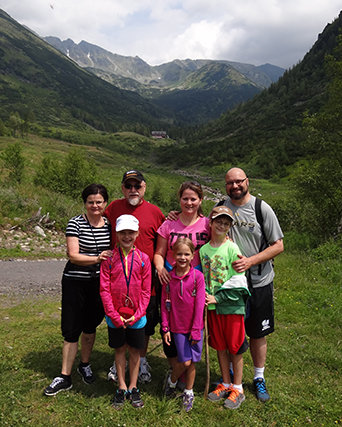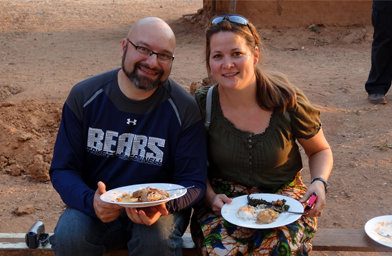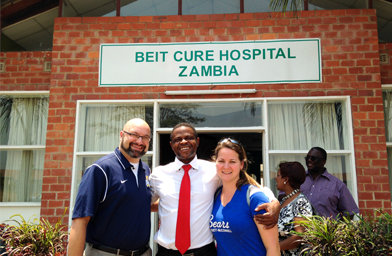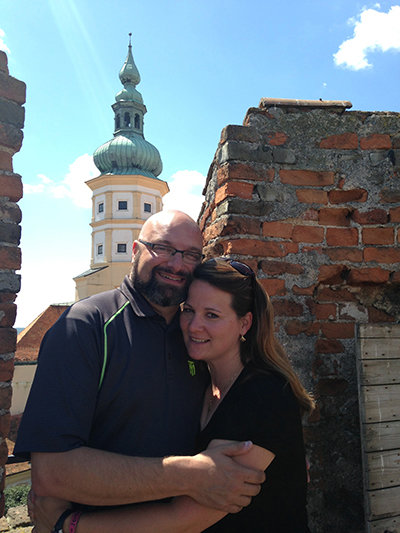 Emir and Hanna Caner stand amid the Vysoke Tatry Mountains in Slovakia with Hana’s parents, Vera and Jan Titera. The Caner children in front, left to right, are Daniela, 10, Anna, 8, and John Mark, 12. CANER FAMILY/Special[/caption]
Emir and Hanna Caner stand amid the Vysoke Tatry Mountains in Slovakia with Hana’s parents, Vera and Jan Titera. The Caner children in front, left to right, are Daniela, 10, Anna, 8, and John Mark, 12. CANER FAMILY/Special[/caption] CLEVELAND — Hana (Titera) Caner, wife of Truett-McConnell College president Emir Caner, was born in Czechoslovakia in 1975 and grew up in an era when the Communists were making concerted efforts to stamp out dissent. Tragically, Hana can see the same kind of cultural and political shift in America that she saw developing in her Central European country when she was a child and teenager.
In order for the Communists to accomplish their diabolical agenda in Czechoslovakia they made mass arrests, purged unions, and persecuted religions, particularly Christianity. The repressive policies and rigid Soviet-style economic policies continued throughout the 1970s despite inflation and a sluggish economy. In 1977, the appearance of a declaration of human rights called Charter 77, which was signed by 700 intellectuals and former party leaders, instigated further repressive measures. It was not until 1989 that things began to change for the better.
The people of Czechoslovakia mounted massive antigovernment demonstrations in Prague. At first the police suppressed the uprisings, but as democratization swept through Central and Eastern Europe things began to change. The Communist party leadership resigned in November and by December a new non-Communist cabinet took over.
Under Communist rule, Czechoslovakia had a Soviet-style planned economy in which its highly developed industry as well as trade, banking, and agriculture were under state control. However, in the early 1990s through what was called the “Velvet Revolution” the last of the Soviet troops departed and a free parliamentary election was held.
Hana’s father, Jan Titera, former secretary of the Czech Baptist Union and presently an evangelist, was a pastor during those years of Soviet domination. Hana recalled, “I now know he suffered persecution, especially psychological persecution, during those days, but he would never tell us about the things he had to endure back then. He was often taken to the Town Hall for interrogation and suffered mental and verbal abuse.”
“I think loud talking reminds him of the verbal abuse he endured in those interrogation sessions.”
Under the Communist oppression, the state paid a “church secretary” to watch over the activities of the local pastors, listening to their sermons, analyzing their activities outside the church, and intimidating pastors who they deemed a threat to their way of life.
Hana, speculating about the past and the psychological pressures undergone by her father, stated, “Even today when he visits with us, if the children raise their voices or if there is loud talking he responds, ‘Please don’t yell.’ I think loud talking reminds him of the verbal abuse he endured in those interrogation sessions.”
Hana mentioned three areas of great concern as she observes present trends in the United States. “First,” she stated, “The thing that scares me the most is the government and media propaganda. In Czechoslovakia the Communist leadership told us what we could do and what we could not do.
“I fear that America is becoming less and less a government of the people and by the people. The majority vote on some issues does not seem to matter, because the Supreme Court can overrule the majority; and with the use of Executive Orders the president is pushing his agenda and propaganda.
“The checks and balance system that the founding fathers of this country established in our documents is being largely disregarded today. This is shocking to me.”
 Emir and Hana Caner enjoyed the guest-of-honor treatment at a Zambian village with a feast consisting of chicken, potato leaves, and peanut butter with potatoes and rice.
Emir and Hana Caner enjoyed the guest-of-honor treatment at a Zambian village with a feast consisting of chicken, potato leaves, and peanut butter with potatoes and rice.Truett-McConnell’s First Lady expressed her second apprehension. “The idea of our schools here in America removing history from the curriculum or revising history is a great concern. In Czechoslovakia we had very little information in our history books about America. When I was growing up, our history books vilified America, deeming her enemy number one while making Mother Russia the savior of the Czech people.
“While the Soviet Union was seen in a positive light, Americans were described as imperialists who were attempting to enslave other nations and take over the world. Even our history of World War II, where Americans sacrificed so much, ignored America’s role in freeing my country. Education was simply about indoctrination. We were only to give the proper answers but never ask questions.
“When I was in the seventh grade I was told that I would have to go to a mandatory meeting. In that meeting the principle of the school told me that since my father was a pastor I would have to work in a factory where I would have no influence.
“My grandfather was a lawyer and was told that he, due to his rejection of the Communist Party, could no longer practice law. He had to work in the post office where he would have no influence.”
 Emir and Hana Caner stand with Dr. Kachinga Sichizyaat, a neurosurgeon at Beit Cure Hospital in Lusaka, Zambia. Truett-McConnell College partners with the hospital to send nursing students there between their junior and senior years.
Emir and Hana Caner stand with Dr. Kachinga Sichizyaat, a neurosurgeon at Beit Cure Hospital in Lusaka, Zambia. Truett-McConnell College partners with the hospital to send nursing students there between their junior and senior years.Hana continued, “The redistribution of wealth that we are beginning to see in this country also reminds me of what happened in my home country under Communist control. In Czechoslovakia, if anyone had a good business the government took it over and ran it. The Communists were afraid of people having power and influence. If people did not obey the government edicts they were punished.
“We were able to have our church services, but we could have no church building. Most of the churches met in the same building and were given a time limit for the worship services. We were herded in and out of the building with no time for fellowship or socializing.
“The Communist leadership made sure that KGB agents (Communist police) were present at times for the services to make sure that no one said anything against the government. What happened last year in Houston, TX when the openly lesbian mayor issued subpoenas demanding a group of pastors turn over any sermons dealing with homosexuality or gender identity happened in Czechoslovakia regularly under Communist control.”
In spite of the alarming trends Hana is seeing in the United States she is happy to be an American. In fact, she became an American citizen in December of 2013.
“I fear that America is becoming less and less a government of the people and by the people.”
In a recent radio interview Hana testified, “The process is actually not as difficult as you might think. I had 100 questions I had to learn and memorize. You have to prove you can speak the language, which meant you had to read a sentence in English and show that you understand it.
“To me that day was pretty amazing. Because I was there in a room with 150 people representing 51 different countries and I remember thinking, ‘You know all these people have their own stories of what freedom means to them.’
 Emir and Hana Caner stand together in the city where they met, Mikulov, in the Czech Republic. Balthasar Hubmaier, a personal hero of Emir Caner’s, fled to the city under threat of death as he was pursued for his Anabaptist views. CANER FAMILY/Special[/caption]
Emir and Hana Caner stand together in the city where they met, Mikulov, in the Czech Republic. Balthasar Hubmaier, a personal hero of Emir Caner’s, fled to the city under threat of death as he was pursued for his Anabaptist views. CANER FAMILY/Special[/caption] “The song ‘God Bless the USA’ is very touching to me, because I don’t really think people pay attention to the words. But it says, ‘I thank my lucky stars to be living here today, because the flag still stands for freedom and they can’t take that away.’ As I stood there to get my American citizenship I was thinking, ‘I hope they will not take this freedom away. I hope my children can live in a free country.’
“And then he (Lee Greenwood) talks about the sacrifice of all those people who give their lives for our freedom.
“From the depths of my heart I am so thankful for our American troops and everything they are doing because they understand the cost of freedom.
“Although I can see our freedoms being slowly taken away I know where our hope lies and that is in Jesus Christ. I understand that we as conservative Christians must go out there and vote, vote, vote. Don’t vote based on your pocketbook, but look at those candidates and look at what they stand for and make sure to go vote for the person who understands freedom and wants to fight for freedom.
“God is in control no matter what happens,” asserts Hana, “But that does not mean we have to be passive and assume God will take care of it. We need to be active and go out there and stand for what is right. But we need to pray for revival and we need to pray that people proclaim the Gospel and stand for what is rightfully ours – our freedom.”